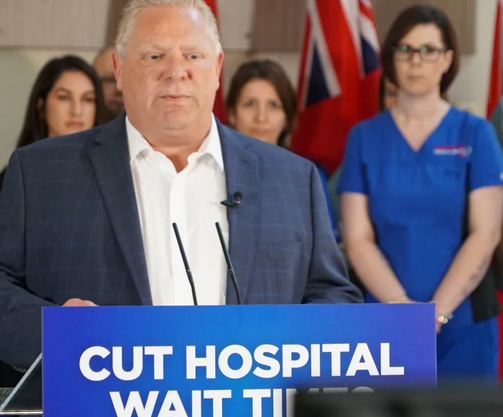 By Ray Rivers
By Ray Rivers
February 16th, 2023
BURLINGTON, ON
We are still here – find out why
What Canadians need to ask their provincial and territorial governments is why they need more federal dollars for health care. Most provinces ran a budgetary surplus last year while the federal government still had a massive deficit.
For example, Ontario’s system is in crisis mode, yet the government is sitting on a $2 billion surplus from last year. According to the new leader of the NDP, ”…Ford is on track to leave almost $20 billion on the table, deliberately under-spending on health care, education, and justice – services that are vital to Ontarians.”

Prime Minister with all the Premiers haggling over how much money was going to be put into health care.
It a sad and dangerous game. Like a dog in a manger, the provinces claim constitutional responsibility for managing the health sector, yet they starve it into near ruin. And then go cap in hand begging for more federal money. The consequence is that Canadians, once proud of our health care system, are rapidly beginning to see the systems as a failure. And that may have been the strategy all along.

A photo op – is this anything more than that?
It is as if the provincial governments are deliberately running down our health systems so they can turn over much more to private for-profit operators. And since that will just drive up health costs even more, user fees may be just around the corner. In other words… the end of universal health care and the adoption of something akin to the more costly and inequitable US model.
Part of the problem is that health care is just another budget item in another provincial ministry competing with all those other government priorities, such as that sexy highway-to-nowhere that Mr. Ford wants to build. And being the single biggest budget item, it becomes an easy target for the bean counters and those political leaders who are ideologically opposed to the idea of socialized health care anyway.

Coyne: even as spending has increased over the years to its highest levels ever, wait times and other measures of efficiency have worsened.
Andrew Coyne, who writes a column in the Globe and Mail, recently suggested something to the effect that the federal government, rather than giving the provinces more money, should actually cut funding to zero. If I understand his ‘spare the rod and spoil the child’ argument correctly, cutting federal funding would force the provinces to reform health care instead of looking to blame someone else for their incompetence.
Coyne notes that even as spending has increased over the years to its highest levels ever, wait times and other measures of efficiency have worsened. The government’s pet excuse is that the generation of aging baby boomers requires more care. While there is some truth to that, the fact is that the average age of Canadians, which hovers around 40 years has barely changed over the last few years. And even the pandemic has receded.
Canada’s universal health care system was born in the late 1960’s as a 50/50 sharing arrangement between the two orders of government. That changed when Paul Martin in the 90’s became a hero to fiscal conservatives by finally ending the long string of federal deficits. But in order to do that he cut provincial health transfers through some slight-of-hand which reduced the fed’s ante to more like 20%.
Coyne’s proposal is intriguing, but without the funding ‘carrot’ the federal government would have no way to enforce the Canada Health Act. And that means that those provinces like Alberta, Ontario and even Saskatchewan, the very birthplace of socialized health care, would be free to just check out of universal health care and go straight to the extra billing model. Federal funding is the glue that keeps the provinces in line and the Canada Health Act alive.
So, given little choice, Mr. Trudeau has been forced to do what the provinces have been demanding, and offer another $46 billion over the next decade. But Coyne is right that giving more money will just forestall reform, especially if that money doesn’t go into areas the federal government has requested. Meanwhile the provincial governments grumble that it’s not enough but will take it anyway. They know they’ve won the game, but good luck to federal demands for greater accountability.
In the case of Ontario and Alberta, the new money will just be used to top up payments for the new private for-profit health care operators and more costly contracted nurses. Or it’ll be repackaged and channelled into some other project. And wait times and hospital crowding will only get worse.
 Ray Rivers, a Gazette Contributing Editor, writes regularly applying his more than 25 years as a federal bureaucrat to his thinking. Rivers was once a candidate for provincial office in Burlington. He was the founder of the Burlington citizen committee on sustainability at a time when climate warming was a hotly debated subject. Ray has a post graduate degree in economics that he earned at the University of Ottawa. Tweet @rayzrivers
Ray Rivers, a Gazette Contributing Editor, writes regularly applying his more than 25 years as a federal bureaucrat to his thinking. Rivers was once a candidate for provincial office in Burlington. He was the founder of the Burlington citizen committee on sustainability at a time when climate warming was a hotly debated subject. Ray has a post graduate degree in economics that he earned at the University of Ottawa. Tweet @rayzrivers
Background links:


















Have we learned nothing over the past 40 years? The provincial governments view funding as a one way street. Rightly or wrongly, the federal government poured money into all aspects of our economy during the COVID lockdowns. This money went to individuals, corporations, municipalities and provincial governments.
The feds and provincial government have shown over and over again that they can/will not work cooperatively. By having something like healthcare be a shared funding/responsibility, each side gets to blame the other and, not necessarily, be wrong in so doing.
It’s time we had a true National Health Care system, whereby the feds pay 100% of the costs. While the feds would need to find more tax revenue in order to do so, the provinces would have no justification for their current rates of taxation. Call me skeptical of the numbers and arguments from both sides, it won’t get any better till one or the other takes full responsibility for our healthcare system.
I guess no comment on how the Wynne government gutted out health care system. Here’s an article from the most socialist rag in the province. https://www.thestar.com/opinion/commentary/2014/02/05/kathleen_wynne_fails_to_act_on_growing_healthcare_mess_hepburn.html. Wynne also commented that her biggest regret was her failure in heath care.
So let me understand your logic. The provinces are fiscally responsible and run a surplus. The federal liberals are spending like drunken sailors, $7000/night hotel rooms, $1500/hr consultants (I could write pages on liberal waste, yet no money for heath care) and you paint the current provincial leadership as the bad guys – rich.
I agree health care is a mess. Its too “hospital centric” and the hospital CEO’s want the control the biggest piece of the pie. The hospital CEO’s are some of the highest paid civil servants. Hospitals are the most expensive place for any medical treatment, let’s get as many services as reasonable out of the hospital system and into clinics, privately run or otherwise, of course in line with the Canada Health Act.
Patient data is another big issue, this needs to be digitized and secure. What Ford has done with allowing pharmacists to prescribe certain drugs to patients and expansion of private clinics is a step in the right direction.
Well argued Ray. I agree with most of your conclusions on where our health care system is headed and the motives behind. However, I differ on many of your observations, particularly as they relate to decades of provincial health care funding.
When I retired at the end of 2007, the Ministry of Health and Long Term Care comprised over 42% of the provincial budget and, unlike all other ministries, experienced an increase in funding of about 8% year over year. Every other program might experience a one-time increase in budget relative to the government’s policy agenda of the day but, normally, would be expected to constrain discretionary funding by 2 to 5% each year. The constraints experienced by programs such as transportation, natural resources, labour, community and social services, colleges and universities and energy were largely to accommodate an annual increase in health care (and frequently education) costs.
There are many critical flaws in the current provincial policy formulation, funding and operational health care models; the most destructive, I believe, is that the system is hospital rather than patient centric. It tends to focus on the institutions and their infrastructure with deliverables and outcomes that are skewed to and reward the status quo or, at best, posit an uneasy truce with necessary change. The senior ranks of the Ministry of Health and Long Term Care is populated by administrators – many drawn from the ranks of hospital CEO’s and Chiefs of Staff. Indeed, even the current Secretary of Cabinet, the Premier’s Deputy Minister and head of the Civil Service, is a past hospital CEO. There was, and I would argue still is, a tendency to protect the relative autonomy of the inter-dependent but still largely separate fiefdoms that comprise our health care network.
In short, there is an inertia in the system; advances in health care technology and science are seldom matched by corresponding or equal advances in patient care. Patient-focused perspectives are slow to change in what is a closed system with senior staff turnover and renewal that is below that of private sector or other public sector institutions. The CEO of our local hospital, for example, told me in 2015 that he “was brought in to turn the hospital around”. He had already been there for six years at that point and is still there eight years later. Has the hospital been turned around? I think we have a hung jury there. It is easier to reach consensus that the length of his sinecure is unusual. And his example is by no means isolated or atypical. It is no surprise then that the system overall is neither nimble nor free of an ingrained complacency.
In terms of availability and access, I would argue that our “universal” health care system ceased to exist some time ago. Will Doug Ford be its final executioner – most possibly. But I find it hard to shed a tear.
It’s disgusting the way the provinces mostly Conservative are playing this game
health care is at the heart of our democracy in Canada…we are not the U.S.A.
There is an error in this column which happened somewhere between submission of the column and its publication – In the second paragraph – the provincial surplus last year was $2.1 billion, not $20. I apologize on behalf of the Gazette.